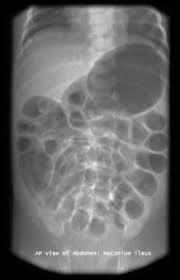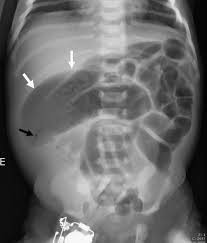
 Earliest stools of an infant.
Earliest stools of an infant.
Composed of materials ingested during utero.
Contains intestinal epithelial cells, lanugo, mucus, amniotic fluid, bile, and water., and is almost sterile, odorless, viscous and sticky.
It is completely passed by the end of the first few days of life.
Normally stored in the infant’s bowel until after birth.
Sometimes it is expelled into the amniotic fluid prior to birth or during labor and delivery and is a sign of fetal distress, and puts the neonate at risk of meconium aspiration.
Meconium can be tested for excessive exposure to alcohol and drugs.
In healthy newborn children 94-99% pass meconium by 24 hours, an 100% by 48 hours.
Failure to pass meconium seen in Hirschsprung’s disease and cystic fibrosis.
Amniotic fluid is stained with meconium fluid is brown.
About 20% of cases of cystic fibrosis present with meconium ileum.
Meconium ileum is associated with a risk of intestinal perforation.
